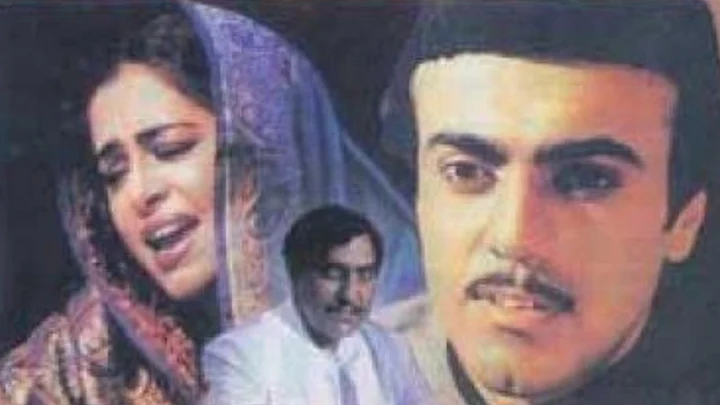For many people, Chaitanya Tamhane's The Disciple (2021) might be their first-ever experience with Hindustani (Indian) classical music in a feature film. Even this has been possible owing to the Marathi film's global release on the biggest OTT platform, else, it could have also ended up as one of the many overlooked regional films.
Undoubtedly, there has been a lacuna in the authentic representation of pure classical music in Indian cinema, especially, since the turn of the century. But the previous century did witness sporadic bouts of films drenched in the traditions of our classical music. The most acclaimed ones among these are Mani Kaul's Dhrupad (1983) and Siddheshwari (1989), Kumar Shahini's Khayal Gatha (1989), and Shyam Benegal's Sardari Begum (1996).
Unlike the aforementioned films of Kaul and Shahini, Benegal's film, which turns 25 today, focuses more on the tumultuous personal life of its titular singer than diving deep into the intricacies of her thumri music. In that sense, it can be likened more to The Disciple which also explores its artist more than the art. Moreover, Tamhane's brilliant film seems to have taken some inspiration from Sardari Begum.
For instance, a pivotal scene in The Disciple shows a veteran journalist debunking the myths created around some revered classical singers. He reveals to the protagonist Sharad that Maai's (idolised by Sharad) overbearing nature damaged her daughter's career. Also, one highly-acclaimed singer initially used to be a mistress of a wealthy businessman. Both these references perhaps allude to Sardari Begum.
The National Award-winning Sardari Begum chronicles the life of its eponymous real-life thumri singer through several flashback sequences. It opens with the accidental death of Sardari (Kirron Kher) due to a rioting mob outside her house in Delhi. Tehzeeb Abbasi (Rajina Raj Bisaria), a young reporter, is assigned by her editor/lover to cover the story. On learning that Sardari was her father's estranged sister, Tehzeeb becomes curious to know more about her aunt.
Thus, she conducts a series of interviews with people who were associated with Sardari as they recount their experiences with the singer. Screenwriters Khalid Mohamed and Shama Zaidi unfold Sardari's story in Rashomon-style as the different characters flesh out her personality from their memories, thereby, building an enigma around her.
Sardari Begum was a woman of contradictions. While she constantly rebelled against the patriarchal attitude of men and lived life on her own terms, when it came to her daughter Sakina (played by Rajeshwari Sachdev in the film), Sardari exercised complete control over her life. She didn't allow Sakina to pursue education and also prevented her from having a romantic relationship or getting married. Without caring for Sakina's desires and ambitions, Sardari wanted Sakina to devote her life to music.
This led to a strained relationship between the two. Despite being flawed, Sardari was a golden-hearted woman. She was generous, affectionate, and always tried to help her brother and father monetarily even after being disowned by them for becoming the mistress of a landlord. Later, in her marriage too, Sardari let her husband handle her money matters while she focused solely on singing. She would regret it later as her husband swindled a lot of money.
Sardari's life has many parallels with that of another real-life female artist, Hansa Wadkar. Benegal's earlier film Bhumika (1977), on the unconventional Marathi actress, shows how the rebellious Wadkar was also constantly at odds with the men in her life who tried to control her.
They expected her to adhere to their notions of how a woman should lead her life. In Sardari Begum, Tehzeeb perfectly points out to her father (Sardari's brother) that society expects women to essay the 'bhumika' (role— an obedient girl to her parents, an ideal wife to her husband, and a sacrificing mother to her child.
If a woman tries to break free from these conventions and live differently, she gets condemned by the moral custodians of society. Even in her illegitimate relationship with the landlord Hemraj (Amrish Puri), Sardari never gained total freedom as she was restricted to performing only at his home and could never sing at concerts.
The narrative of Sardari Begum cannot be complete without highlighting the most famous aspect of Sardari's life - music. The deceased Vanraj Bhatia created some wonderful thumri compositions which were penned by Javed Akhtar and rendered by Arati Ankalikar-Tikekar, Asha Bhosle, and Shubha Joshi.
One of my favourite songs in the films is 'Raah Mein Bichhi Hai Palke', which is a 'jugalbandi' between the younger Sardari (Smriti Mishra) and her concubine guru Iddan Bai (Surekha Sikri). Years later, Sardari comes into her own and becomes one of the foremost exponents of thumri music. But without the tutelage of Iddan Bai, Sardari would not have gained mastery over her craft. It is this guru-shishya tradition, the bedrock of Indian classical music, that Sardari wished to pass on to her daughter.
In Rajan Khosa's Dance of the Wind (1997), the daughter/disciple of a celebrated classical singer loses her confidence to sing after her mother's death. But, fortunately, in Sardari Begum, the death of her mother dissolves the bitterness in Sakina's heart, and she decides to propel the glorious legacy of the thumri legend.
(At The Quint, we question everything. Play an active role in shaping our journalism by becoming a member today.)
